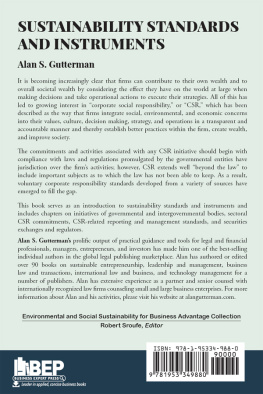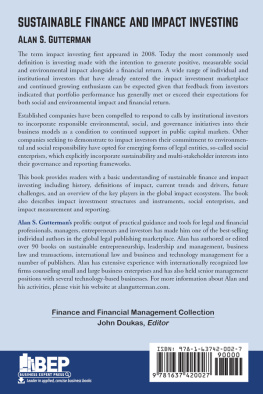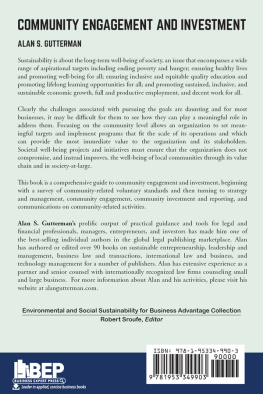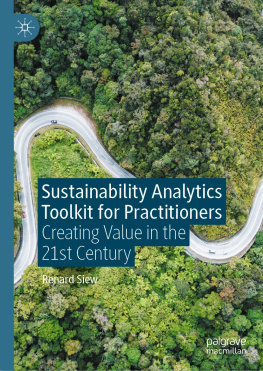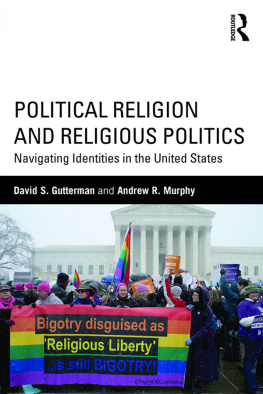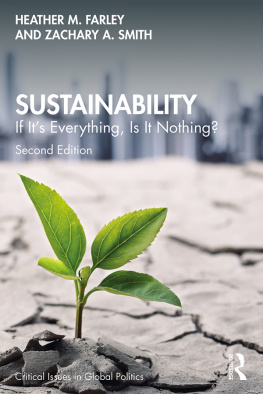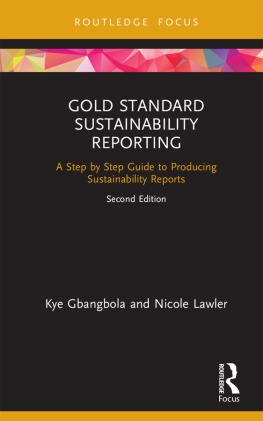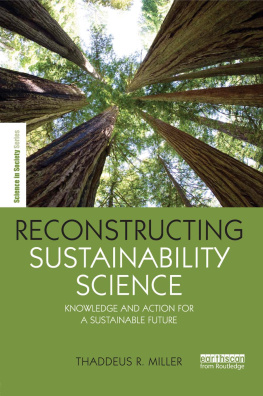Alan S. Gutterman - Sustainability Standards and Instruments
Here you can read online Alan S. Gutterman - Sustainability Standards and Instruments full text of the book (entire story) in english for free. Download pdf and epub, get meaning, cover and reviews about this ebook. year: 2021, publisher: Business Expert Press, genre: Politics. Description of the work, (preface) as well as reviews are available. Best literature library LitArk.com created for fans of good reading and offers a wide selection of genres:
Romance novel
Science fiction
Adventure
Detective
Science
History
Home and family
Prose
Art
Politics
Computer
Non-fiction
Religion
Business
Children
Humor
Choose a favorite category and find really read worthwhile books. Enjoy immersion in the world of imagination, feel the emotions of the characters or learn something new for yourself, make an fascinating discovery.
- Book:Sustainability Standards and Instruments
- Author:
- Publisher:Business Expert Press
- Genre:
- Year:2021
- Rating:5 / 5
- Favourites:Add to favourites
- Your mark:
- 100
- 1
- 2
- 3
- 4
- 5
Sustainability Standards and Instruments: summary, description and annotation
We offer to read an annotation, description, summary or preface (depends on what the author of the book "Sustainability Standards and Instruments" wrote himself). If you haven't found the necessary information about the book — write in the comments, we will try to find it.
Sustainability Standards and Instruments — read online for free the complete book (whole text) full work
Below is the text of the book, divided by pages. System saving the place of the last page read, allows you to conveniently read the book "Sustainability Standards and Instruments" online for free, without having to search again every time where you left off. Put a bookmark, and you can go to the page where you finished reading at any time.
Font size:
Interval:
Bookmark:

Sustainability Standards and Instruments
Sustainability Standards and Instruments
Alan S. Gutterman

Sustainability Standards and Instruments
Copyright Business Expert Press, LLC, 2021.
Cover design by Charlene Kronstedt
Interior design by Exeter Premedia Services Private Ltd., Chennai, India
All rights reserved. No part of this publication may be reproduced, stored in a retrieval system, or transmitted in any form or by any meanselectronic, mechanical, photocopy, recording, or any other except for brief quotations, not to exceed 400 words, without the prior permission of the publisher.
First published in 2021 by
Business Expert Press, LLC
222 East 46th Street, New York, NY 10017
www.businessexpertpress.com
ISBN-13: 978-1-95334-988-0 (paperback)
ISBN-13: 978-1-95334-989-7 (e-book)
Business Expert Press Environmental and Social Sustainability for Business Advantage Collection
Collection ISSN: 2327-333X (print)
Collection ISSN: 2327-3348 (electronic)
First edition: 2021
10 9 8 7 6 5 4 3 2 1
Description
Academics, policy makers, business people, members of civil society, and individuals have all recognized the significant effect the activities of the private sector have on employees, customers, communities, the environment, competitors, business partners, investors, shareholders, governments, and others. It is also becoming increasingly clear that firms can contribute to their own wealth and to overall societal wealth by considering the effect they have on the world at large when making decisions and take operational actions to execute their strategies. All of this has led to growing interest in corporate social responsibility (CSR), which has been described as the way that firms integrate social, environmental, and economic concerns into their values, culture, decision making, strategy, and operations in a transparent and accountable manner and thereby establish better practices within the firm, create wealth, and improve society. The commitments and activities associated with any CSR initiative should begin with compliance with laws and regulations promulgated by the governmental entities have jurisdiction over the firms activities; however, CSR extends well beyond the law to include important subjects as to which the law has not been able to keep. As a result, voluntary corporate responsibility standards developed from a variety of sources have emerged to fill the gap in areas such as corporate governance and ethics; health and safety; environmental stewardship; human rights (including core labor rights); working conditions and industrial relations; community involvement, development, and investment; consumer issues; fair competition; anti-bribery and anti-corruption measures; accountability, transparency, and performance reporting; and supplier relations. This book is intended to serve as an introduction to sustainability standards and instruments and includes chapters on initiatives of governmental and intergovernmental bodies, sectoral CSR commitments, CSR-related reporting and management standards and securities exchanges and regulators. The book also provides information on CSR-related nonprofits and NGOs that readers can use as resources for broadening their understanding of private sector activities relating to CSR and sustainability.
Keywords
sustainability; sustainability standards; CSR
Contents
Academics, policy makers, businesspeople, members of civil society, and individuals have all recognized the significant effect the activities of the private sector have on employees, customers, communities, the environment, competitors, business partners, investors, shareholders, governments, and others. It is also becoming increasingly clear that firms can contribute to their own wealth and to overall societal wealth by considering the effect they have on the world at large when making decisions and take operational actions to execute their strategies. All of this has led to growing interest in corporate social responsibility (CSR), which has been described as the way that firms integrate social, environmental, and economic concerns into their values, culture, decision making, strategy, and operations in a transparent and accountable manner and thereby establish better practices within the firm, create wealth, and improve society.
The commitments and activities associated with any CSR initiative should begin with compliance with laws and regulations promulgated by the governmental entities have jurisdiction over the firms activities; however, CSR extends well beyond the law to include corporate governance and ethics; health and safety; environmental stewardship; human rights (including core labor rights); sustainable development; working conditions (including safety and health, hours of work, wages); industrial relations; community involvement, development, and investment; involvement of and respect for diverse cultures and disadvantaged peoples; corporate philanthropy and employee volunteering; consumer issues, customer satisfaction, and adherence to principles of fair competition; anti-bribery and anti-corruption measures; accountability, transparency, and performance reporting; and supplier relations, for both domestic and international supply chains. The law has not been able to keep up and the gap has been filled by CSR standards promulgated from a variety of sources.
According to Williams, most of the corporate responsibility standards are voluntary, although India passed legislation in 2014 that required companies to establish a corporate responsibility committee at the board level and contribute 2 percent of net profits to corporate responsibility initiatives. It should not be forgotten, however, that many of the topics generally included within the general subject of CSR have previously been addressed to some degree in domestic regulations covering labor rights, environmental and consumer protection, anti-discrimination, and anti-bribery. Countries vary in the degree to which regulatory standards relating to corporate responsibility are relied upon and Williams noted that empirical evidence suggested that the underlying regulatory standards effectively shape the sustainability culture within countries, and have both a strong effect on how companies handle corporate responsibility issues and a strong effect on the sustainability. For example, Williams pointed out that Matten and Moon have argued that
in countries with stakeholder corporate governance systems and more expansive social welfare arrangements, corporate responsibility is implicit in doing business according to law, so companies do not need to be as explicit about taking on social responsibilities, as do leading companies in more shareholder-oriented countries.
Since the late 1990s there has been a proliferation of transnational, voluntary standards for what constitutes responsible corporate action
Role of the State in CSR
Giovannucci et al. observed that governments have tended to focus on traditional lawmaking activities such as basic guarantees or regulations :
Work to build awareness of the contemporary CSR agenda within developing country agencies, including building understanding on the overall drivers, key players, and effective pressure points, as well as country-specific impact assessments of the CSR agenda for trade and investment promotion.
Font size:
Interval:
Bookmark:
Similar books «Sustainability Standards and Instruments»
Look at similar books to Sustainability Standards and Instruments. We have selected literature similar in name and meaning in the hope of providing readers with more options to find new, interesting, not yet read works.
Discussion, reviews of the book Sustainability Standards and Instruments and just readers' own opinions. Leave your comments, write what you think about the work, its meaning or the main characters. Specify what exactly you liked and what you didn't like, and why you think so.

